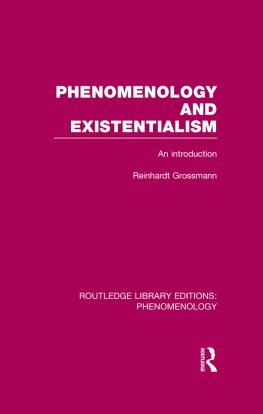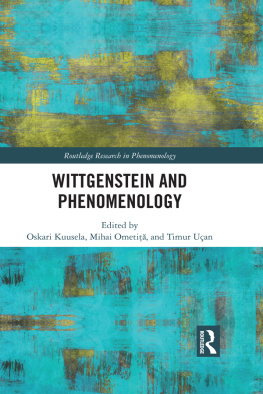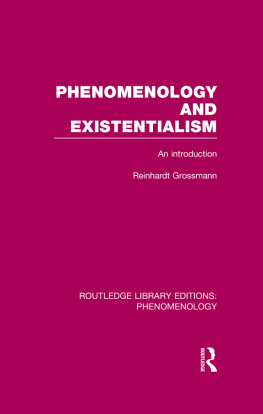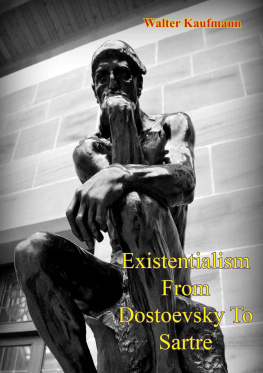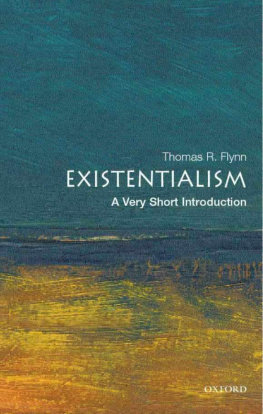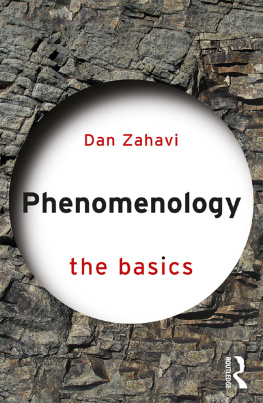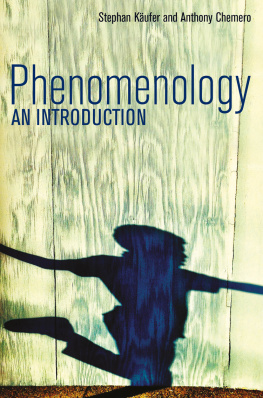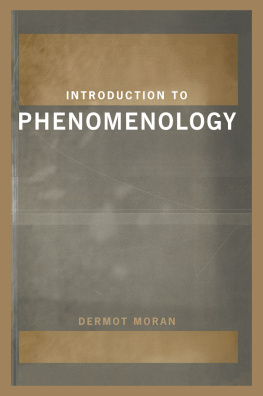ROUTLEDGE LIBRARY EDITIONS: PHENOMENOLOGY
Volume 4
PHENOMENOLOGY AND EXISTENTIALISM
First published in 1984
This edition first published in 2014
by Routledge
2 Park Square, Milton Park, Abingdon, Oxon, OX14 4RN
Simultaneously published in the USA and Canada
by Routledge
711 Third Avenue, New York, NY 10017
Routledge is an imprint of the Taylor & Francis Group, an informa business
1984 Reinhardt Grossmann
All rights reserved. No part of this book may be reprinted or reproduced or utilised in any form or by any electronic, mechanical, or other means, now known or hereafter invented, including photocopying and recording, or in any information storage or retrieval system, without permission in writing from the publishers.
Trademark notice: Product or corporate names may be trademarks or registered trademarks, and are used only for identification and explanation without intent to infringe.
British Library Cataloguing in Publication Data
A catalogue record for this book is available from the British Library
ISBN: 978-0-415-83854-2 (Set)
eISBN: 978-0-203-79854-6 (Set)
ISBN: 978-0-415-85972-1 (Volume 4)
eISBN: 978-0-203-76283-7 (Volume 4)
Publishers Note
The publisher has gone to great lengths to ensure the quality of this reprint but points out that some imperfections in the original copies may be apparent.
Disclaimer
The publisher has made every effort to trace copyright holders and would welcome correspondence from those they have been unable to trace.
First published in 1984
by Routledge & Kegan Paul plc
14 Leicester Square, London WC2H 7PH, England
9 Park Street, Boston, Mass. 02108, USA
464 St Kilda Road, Melbourne,
Victoria 3004, Australia and
Broadway House, Newtown Road,
Henley-on-Thames, Oxon RG9 1EN, England
Set in Palatino, 10 on 12py,
by Hope Services, Abingdon, Oxon
and printed in Great Britain
by T. J. Press (Padstow) Ltd
Padstow, Cornwall
CopyrightReinhardt Grossmann 1984
No part of this book may be reproduced in any form without permission from the publisher, except for the quotation of brief passages in criticism
Library of Congress Cataloging in Publication Data
Grossmann, Reinhardt, 1931
Phenomenology and existentialism.
Includes index.
1. PhenomenologyHistoryAddresses, essays, lectures.
2. ExistentialismHistoryAddresses, essays, lectures.
3. Philosophy, ModernAddresses, essays, lectures.
I. Title.
B829.5.G7 1984 142.7 84-4783
British Library CIP data also available
ISBN 0-7102-0270-9(c)
ISBN 0-7102-0291-l(p)
Contents
This book is based on lectures which I have given for the last ten years or so. This explains its style. Some other features, I think, require a little more explanation.
Different philosophers have quite different conceptions of what philosophy is all about. I am no exception, and my particular conception of philosophy has shaped my treatment of Husserl, Heidegger, and Sartre. In brief, I believe that all important philosopherswhether they know it or not and whether they admit it or notdeal with certain traditional problems. There is a, sometimes hidden, continuity to philosophy. No matter how revolutionary a philosophical movement may at first appear to be, and Phenomenology and Existentialism certainly claimed to be revolutionary, a closer look reveals that the same old problems are merely discussed in a new way. I selected three such problemsthe problem of knowledge, the problem of existence, and the problem of freedomin order to provide some focus to the discussion, and because I believe that they were of major concern to Husserl, Heidegger, and Sartre, respectively.
But philosophical books are written, not only with a definite conception of philosophy in mind, but also from a particular point of philosophical view. My philosophical view is not easily described in contemporary terms. Although I was schooled in what is now called the analytic tradition, I was also taught to appreciate Plato and Aristotle, Aquinas and Scotus, Descartes and Berkeley. I hope to show with this book that one so schooled can appreciate Heidegger and Sartre as well. It is surely silly to assume that only an Existentialist, say, can understand another Existentialist; as silly, I might add, as to believe that all Existentialists talk nonsense.
Finally, there is the fact that I argue, rather vehemently at times, for my own philosophical views. This will undoubtedly offend those who believe that an introductory text should present an unbiased picture. In defense of my polemical style, I can only plead that I find it very difficult to develop the dialectic of a particular problem-the arguments and counterarguments, the choices and limitswithout taking a definite stand myself. I assure the reader that I sound much more dogmatic than I am. And I invite him to develop the arguments further than I have done, refuting my contentions in the process. This is the very stuff of which philosophy is made.
It goes without saying that Husserl, Heidegger, and Sartre have thought and written about things other than knowledge, existence and freedom. Just as it is obvious that there are other Phenomenologists and Existentialists. After all, this is merely an introduction to, not a survey of, Phenomenology and Existentialism. My main criticism of most of the introductions and anthologies in this field is that they contain bits and pieces from numerous sources from Dostojewski to Marcel, without ever following up on any one topic, with the result that the student cannot possibly appreciate the complexity of the issues, or be impressed by the manner in which philosophical problems grow out of each other.
While writing this book, I consulted many times with my colleague Paul Spade, who taught a similar course in the department. I would like to thank him for sharing with me his knowledge of and enthusiasm for some of the more notorious philosophers of our time.
R. Grossmann
Bloomington, Indiana
In order to understand the fundamental ideas of phenomenologists and existentialists, we must consider their origins. Ren Descartes (15961650) philosophy is the source of many of the problems which led to the development of various philosophical movements during the last three hundred years. Phenomenology and Existentialism are no exceptions. Descartes was a modern philosopher. He proposed views contrary to those of the tradition; views which still influence the thought of contemporary philosophers. But he was also steeped in the very tradition which he opposed. He had, as it were, one foot in the tradition and one foot in a new era of philosophy. We consider him to be the father of modern philosophy.
The tradition I am speaking of consisted of the Scholastic philosophy of Descartes time. It consisted of a most complicated, most elaborate, most comprehensive system of ideas going back to St Thomas Aquinas (1224/51274) and, ultimately, to Aristotle (384/3322 B.C.). You may compare it to a most complex Rube Goldberg-type contraption fashioned from Tinker Toys. Descartes, to stay with this picture, thought that this towering edifice needed a slight adjustment. He removed one of the parts and replaced it by another. As it turned out, the replaced part was crucial to the structure. Without it, the whole structure collapsed. The history of philosophy since Descartes can be viewed as consisting of various attempts to erect a new comprehensive system which incorporates some of Descartes views.
Next page
